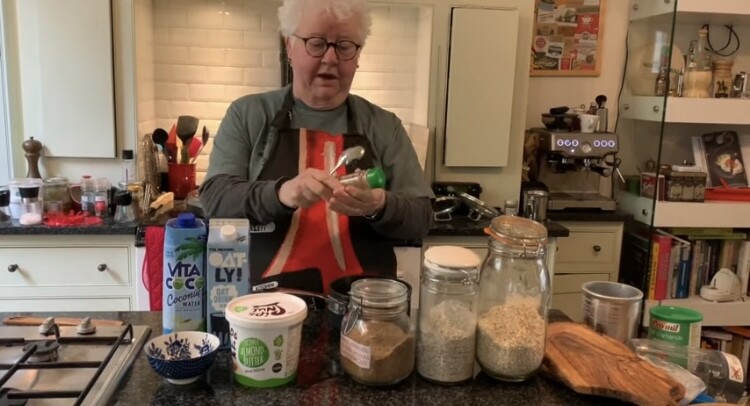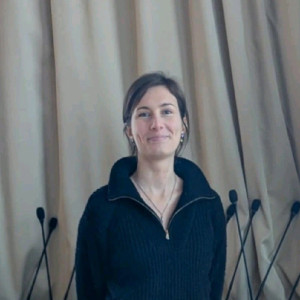
‘Cooking the books’ – Hamish’s Hipster Porridge!
Posted on Mon 5th May, 2025 by Dr Daphné Cousin-Martin
In May 2020, while in lockdown, Scottish crime writer Val McDermid launched a series of cooking videos playfully entitled ‘Cooking the books’. In her fully equipped ‘fiction kitchen’, Val McDermid, filmed by her partner Jo Sharp, endeavoured to recreate dishes that appear in her crime novels, in a manner that makes them accessible to all.
From the start, she explains that she regrets how food generally doesn’t get the attention it should when it comes to crime fiction, and she acknowledges the existence of her food-lover readers. To convey one’s food experiences, the description of the surroundings, of the locals and their language, of the drinks served with the meals is necessary, of course, but food shouldn’t always come second.
Finding one of Elizabeth David’s books on the shelves in the background of the videos wouldn’t seem impossible. Indeed, both McDermid’s books and videos feature good, simple cuisine that brings characters, readers and viewers alike, comfort sprinkled with wit and humour. That is not to say that some depictions of a less healthy diet often associated with Scotland and Britain at large don’t now and again appear in the novels. As for McDermid’s and Elizabeth David’s writing and cooking, sensory experience is of essence.
Every one of the eight selected dishes, however, requires fresh ingredients, spices, herbs, oil and basic kitchen utensils; the cutting, the crackling, the boiling and the steaming are enticing. When the camera zooms in on the result, one feels as if one could almost taste it. Her recipes include ‘Hamish’s hipster porridge’, very quick to cool, and ‘Carol and Tony’s Chicken and Spinach Curry’ for instance. They stress a diverse Scottish cuisine where Mediterranean and Asian influences reveal themselves and where vegetarian twists, or others, are made possible.
The third video is dedicated to Scotch broth, to be found in ‘The Distant Echo’, the first book of the Karen Pirie series. McDermid describes this meal as ‘central heating for the soul’ – a reference to the house in which the broth is served in the novel. It calls for fresh vegetables including onions, a mix of grains such as barley and peas, tinned tomatoes – as her mother used to – or tomato purée – as her grandmother used to – butter, oil and possibly fleur de sel or homemade wild garlic pesto. The Scotch broth is served in a plain white bowl.
It is not just about recipes, it is also about anecdotes and jokes, comments that allow viewers to connect with McDermid just as readers of Elizabeth David’s works would. One joke refers to the soup texture and the characteristic of young Jason Murray, Karen Pirie’s acolyte, as ‘thick’; another to what Val McDermid’s ancestors would think of the additional touch of pesto. She and her partner debate whether a soup actually is considered a meal or a starter. The shared intimacy makes one feel as if one was about to share the delicious meal with the author and it encourages one to adopt such a cooking philosophy.
McDermid closes the video by reading an extract from the book. Alex, one of the students who stumbles upon a body at the start of the book, returns to his parents’ in Kirkcaldy, Fife. Part of the extract reads as follows:
‘Alex swallowed a spoonful of soup. He hadn’t felt hungry, but at the first taste of home-made Scotch broth, he realised he was ravenous. The last he’d eaten had been at the party and he’d lost that twice over. All he wanted now was to fill his belly, but he was going to have to sing for his supper.’
I first witnessed – and tasted – the spirit of such cooking and interest for Scottish regional cuisine on my first encounter with Scotch broth. It was at vegetarian Barbara’s, the friend of a friend, in Edinburgh, in autumn, when some covid 19 regulations were still in place. She didn’t know me nor my mother, but she had cooked this lovely meal for us, which she served with homemade oatcakes and Highland cheese. She then took us to visit the community gardens, and so the loop was closed.
Dr Daphné Cousin-Martin



